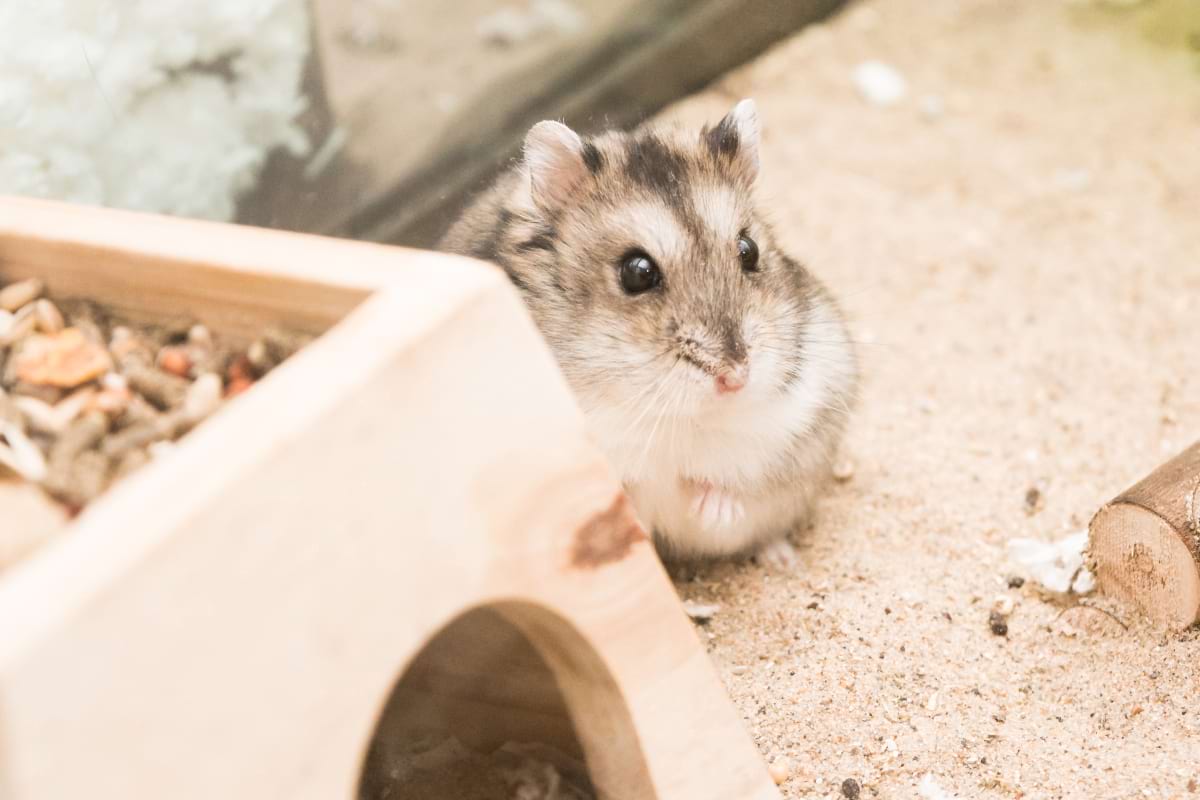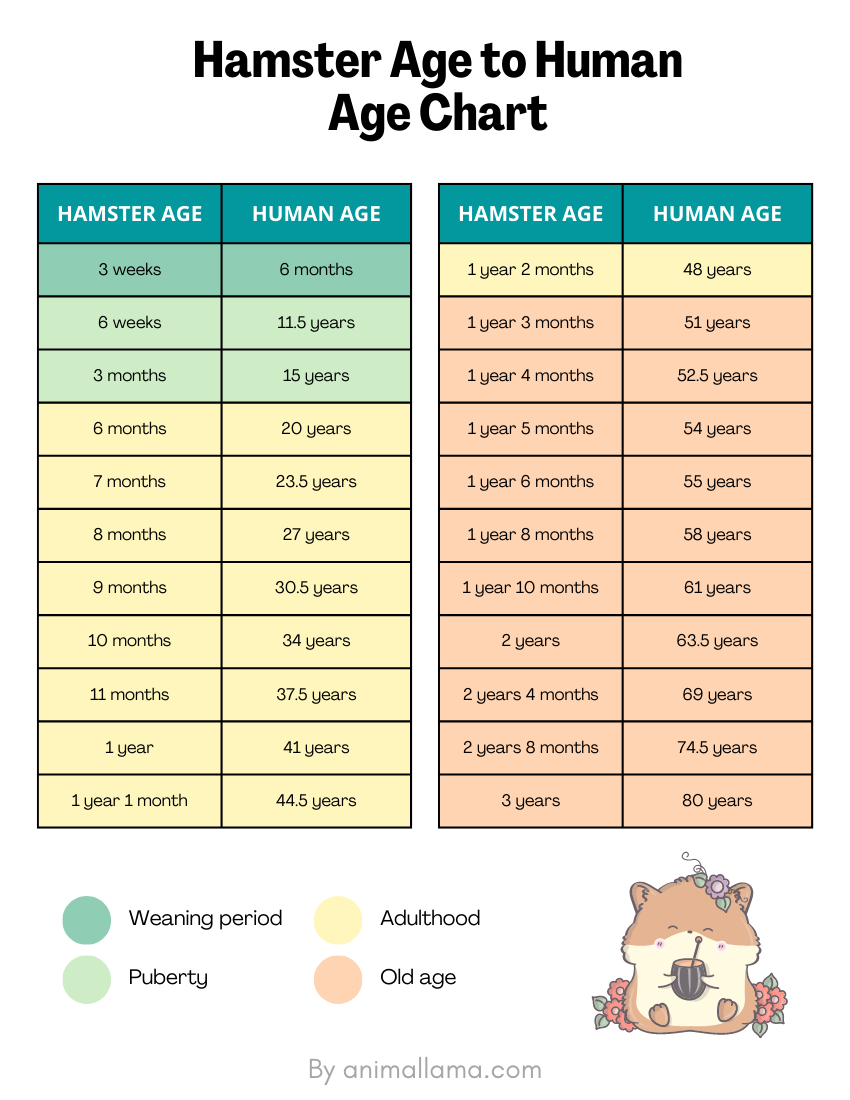Pet Hamster Lifespan & ‘Hamster Years to Human Years’ Chart

Hamsters make wonderful pets, but keeping them comes with a significant drawback: their relatively short lifespan. On average, you can expect to enjoy the companionship of your pet hamster for up to two years.
Pet hamsters reach sexual maturity when they’re just 6 weeks old, while they start to exhibit noticeable signs of aging at around 15 months.
In this article, we’ll look at the average hamster’s lifespan and how their age translates to human age.
Pet Hamster Lifespan: How Long Do Hamsters Live?
Pet hamsters live for 1.5-2 years on average. The maximum expected hamster lifespan is 3 years, although some do live longer than that.
New research from the Royal Veterinary College (RVC) has found that the average age at death for all included hamster species was 21 months (1 year and 9 months).
When it comes to differences in lifespan among Syrian hamsters and dwarf species, there is a lot of conflicting information out there. Some claim Syrian hamsters live longer, while others say dwarf species outlive Syrians. But it can happen either way.
Both Syrians and dwarfs have similar lifespans, and how long they’ll live depends mostly on other factors such as:
- Genetics – Just like humans, some hamsters win the health lottery while others inherit different health conditions that affect their lifespan.
- Diet – No surprise here, a healthy diet contributes to a longer lifespan. This is especially important for dwarf species that are prone to diabetes.
- Activity level – Running, digging, and foraging are all behaviors that keep hamsters in shape and increase their stamina. Hamsters kept in tiny cages have fewer enrichment options and less space to be active, which can contribute to health conditions and chronic stress.
- Stress – They say stress is a silent killer for us humans, and I’m sure you can say the same for hamsters. Hamsters kept in less than adequate conditions experience chronic stress that might not always be visible to our naked eye. This constant stress contributes to a wide variety of health issues.
- Access to vet care – Hamsters are excellent at hiding their illness, so it’s important to take them to a vet as soon as you notice anything off. For example, a health condition such as “wet tail” can lead to death in as little as 2-3 days if not treated.
- Whether they were bred or not (females) – Unbred females live significantly longer than bred females. It is thought that the effects of pregnancy negatively affect female hamsters.
Hamster Years to Human Years Chart
Wondering how old your hamster is in human years?
We’ve put together a little chart explaining when hamsters reach puberty, adulthood, and old age based on available research. This hamster years to human years chart was created based on the data for Syrian hamsters.

If you want to download this and other hamster printables we have in our Library, make sure to subscribe to our newsletter to get access!
Hamster Life Stages Explained
Let’s explore the various hamster life stages and how they relate to humans. However, it’s important to remember that this is just an estimate and, like humans, some hamsters may mature earlier or later than others.
Weaning Period
Hamster weaning usually begins around three weeks of age and continues until the hamster is about four weeks old. At this point, the hamster should be fully weaned and able to eat solid food on their own.
Human babies begin consuming solid food and drinking from a cup at around 6 months old. Based on this, a 3-week-old hamster is roughly equivalent to a 6-month-old human baby.
Puberty
Puberty is the stage of development when a hamster reaches sexual maturity and becomes capable of reproducing. This typically happens at around 6 weeks of age, although it can vary depending on the sex and individual hamster. Females usually reach puberty a bit later than males.
Signs of puberty in female hamsters include a reddening of the genitals, increased activity, and a desire to explore their surroundings. In males, signs of puberty include increased scent marking, territorial behavior, and mounting of other hamsters.
Humans reach puberty at approximately 11.5 years old, so a 6-week-old hamster would be equivalent to an 11.5-year-old human.
Adulthood
While hamsters can breed as early as 6 weeks of age, they are considered adults at 6 months of age, as they attain physiological, reproductive and psychological maturity.
By then, Syrian hamsters reach their full length of around 6 inches and weigh 3-5 ounces. Females are usually larger than males; that’s why getting a larger cage for a female Syrian is often recommended.
Early adulthood in humans begins when we’re 20, and the growth plates in the scapula fuse. Based on that, scientists equate a 6 months-old hamster to a 20-year-old human.
Reproductive Senescence (Start of Old Age)
Reproductive senescence in hamsters begins when the female’s reproductive capacity starts to reduce. It happens when female hamsters are 15 months old on average.
In humans, menopause is a marker of reproductive senescence, which happens when women are 51.
So, a 15-month-old hamster would be as old as a 51-year-old human.
Post-senescence Phase
In this phase, hamsters gradually start to show signs of old age. They lose weight, have trouble breathing, and start to slow down. You might also notice hair thinning, vision issues, loss of appetite, or other age-related health issues.
Hamsters can live 21 months after the reproductive senescence phase and reach 3 years of age, although some exceptions live even longer.
Final Thoughts
While our hamsters are not as long-lived as we would like, there are things we can do to increase their lifespan. From keeping them in suitable cages set up to encourage activity, feeding them a healthy diet, to providing timely vet care, there are ways we can improve their life expectancy.
If you have access to an ethical hamster breeder in your area, it’s always better to get your hamster from them than a pet store. Pet stores are known to get their hamsters from breeding mills that put no effort into breeding their hamsters for health and longevity.
References:



